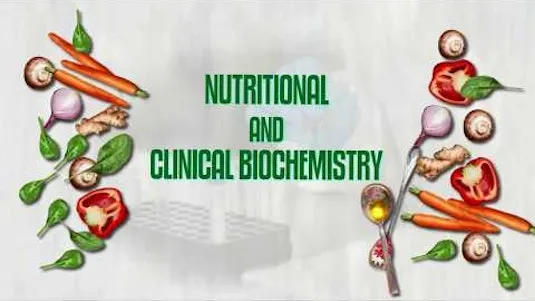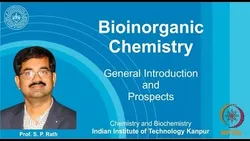
Nutritional and Clinical Biochemistry 
This Nutritional and Clinical Biochemistry course provides an in-depth understanding of the chemical properties of nutrients and other dietary constituents. It covers topics such as their functions at cellular and molecular levels, as well as how clinical investigations of laboratory tests in humans (such as body fluids) are used for diagnosis of diseases and its therapeutic purposes. Students will gain a comprehensive knowledge of the subject and be able to apply it to their own practice. ▼
ADVERTISEMENT
Course Feature
![]() Cost:
Cost:
Free
![]() Provider:
Provider:
Swayam
![]() Certificate:
Certificate:
Paid Certification
![]() Language:
Language:
English
![]() Start Date:
Start Date:
22nd Jan, 2023
Course Overview
❗The content presented here is sourced directly from Swayam platform. For comprehensive course details, including enrollment information, simply click on the 'Go to class' link on our website.
Updated in [May 25th, 2023]
Nutritional and Clinical Biochemistry is a course designed to provide students with an understanding of the chemical properties of nutrients and other dietary constituents. It will explore their functions at cellular and molecular levels, as well as how clinical investigations of laboratory tests in humans (such as body fluids) are used for diagnosis of diseases and therapeutic purposes. Upon completion of the course, students will have a better understanding of the scientific approach to nutrition and clinical biochemistry.
[Applications]
The students who have completed this course can apply their knowledge in various ways. They can use their understanding of the chemical properties of nutrients to develop healthier diets and meal plans. They can also use their knowledge of laboratory tests to help diagnose and treat diseases. Additionally, they can use their knowledge to develop new treatments and therapies for diseases. Finally, they can use their knowledge to help educate others on the importance of nutrition and its role in health and wellness.
[Career Paths]
1. Clinical Nutritionist: Clinical nutritionists are healthcare professionals who specialize in the use of nutrition to promote health and prevent and treat diseases. They provide nutrition counseling and education to individuals and groups, and develop nutrition plans for patients. Clinical nutritionists are also involved in research and policy development. This field is expected to grow significantly in the coming years due to the increasing awareness of the importance of nutrition in health and disease prevention.
2. Clinical Dietitian: Clinical dietitians are healthcare professionals who specialize in the use of nutrition to promote health and prevent and treat diseases. They provide nutrition counseling and education to individuals and groups, and develop nutrition plans for patients. Clinical dietitians are also involved in research and policy development. This field is expected to grow significantly in the coming years due to the increasing awareness of the importance of nutrition in health and disease prevention.
3. Nutrition Scientist: Nutrition scientists are healthcare professionals who specialize in the study of the effects of food and nutrition on human health. They conduct research to understand the role of nutrition in health and disease, and develop evidence-based nutrition guidelines and recommendations. This field is expected to grow significantly in the coming years due to the increasing awareness of the importance of nutrition in health and disease prevention.
4. Food Technologist: Food technologists are healthcare professionals who specialize in the development and production of food products. They are responsible for developing new food products, improving existing products, and ensuring that food products meet safety and quality standards. This field is expected to grow significantly in the coming years due to the increasing demand for safe and nutritious food products.
[Education Paths]
1. Bachelor of Science in Nutritional Science: This degree program provides students with a comprehensive understanding of the science of nutrition and its role in health and disease. Students will learn about the biochemical and physiological processes of digestion, absorption, and metabolism of nutrients, as well as the role of nutrition in the prevention and treatment of disease. The degree also covers the principles of food safety, food service management, and public health nutrition. With the increasing focus on health and wellness, this degree is becoming increasingly popular.
2. Master of Science in Clinical Nutrition: This degree program focuses on the application of nutrition science to the clinical setting. Students will learn about the role of nutrition in the prevention and treatment of disease, as well as the assessment and management of nutrition-related problems. The degree also covers the principles of nutrition assessment, nutrition counseling, and nutrition education. With the increasing focus on preventive health care, this degree is becoming increasingly popular.
3. Doctor of Philosophy in Nutritional Biochemistry: This degree program focuses on the biochemical and physiological processes of digestion, absorption, and metabolism of nutrients. Students will learn about the role of nutrition in the prevention and treatment of disease, as well as the assessment and management of nutrition-related problems. The degree also covers the principles of nutrition assessment, nutrition counseling, and nutrition education. With the increasing focus on preventive health care, this degree is becoming increasingly popular.
4. Doctor of Science in Clinical Nutrition: This degree program focuses on the application of nutrition science to the clinical setting. Students will learn about the role of nutrition in the prevention and treatment of disease, as well as the assessment and management of nutrition-related problems. The degree also covers the principles of nutrition assessment, nutrition counseling, and nutrition education. With the increasing focus on preventive health care, this degree is becoming increasingly popular.
Course Provider

Provider Swayam's Stats at AZClass
Discussion and Reviews
0.0 (Based on 0 reviews)
Explore Similar Online Courses

Commercial Real Estate Investing for Beginners

Price Action Trading - Learn the Fundamentals

Python for Informatics: Exploring Information

Social Network Analysis

Introduction to Systematic Review and Meta-Analysis

The Analytics Edge

DCO042 - Python For Informatics

Causal Diagrams: Draw Your Assumptions Before Your Conclusions

Whole genome sequencing of bacterial genomes - tools and applications

Principles of Biochemistry

Bioinorganic Chemistry


Start your review of Nutritional and Clinical Biochemistry